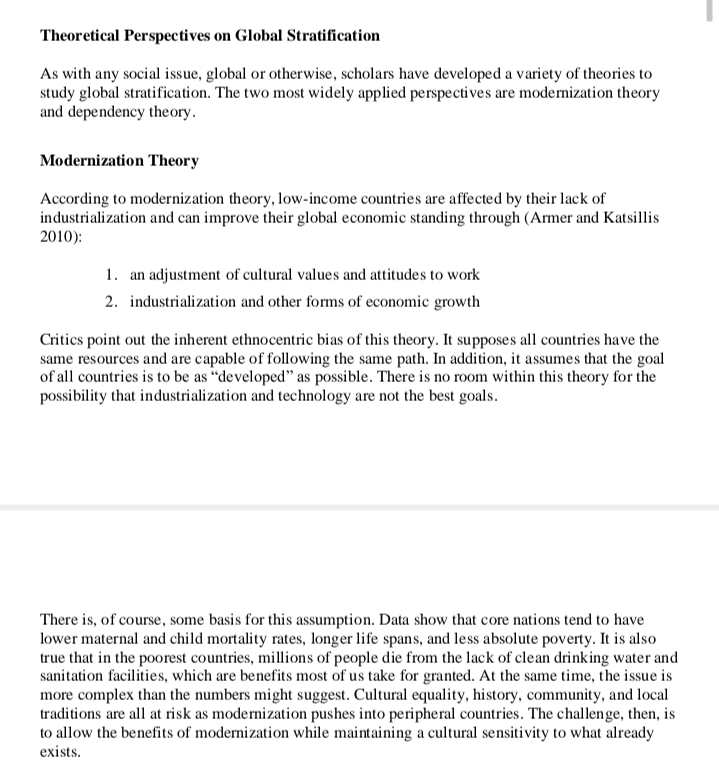Chapter1: Making Economics Decisions
Section: Chapter Questions
Problem 1QTC
Related questions
Question
1. How does Modernization Theory explain how low-income countries improve their globale economicstanding?
2. Explain the last sentence of the last paragraph ‘the challenge, then, is to allow the benefits of modernization while maintaining a cultural sensitivity to what already exists.’

Transcribed Image Text:Theoretical Perspectives on Global Stratification
As with any social issue, global or otherwise, scholars have developed a variety of theories to
study global stratification. The two most widely applied perspectives are modernization theory
and dependency theory.
Modernization Theory
According to modernization theory, low-income countries are affected by their lack of
industrialization and can improve their global economic standing through (Armer and Katsillis
2010):
1. an adjustment of cultural values and attitudes to work
2. industrialization and other forms of economic growth
Critics point out the inherent ethnocentric bias of this theory. It supposes all countries have the
same resources and are capable of following the same path. In addition, it assumes that the goal
of all countries is to be as "developed" as possible. There is no room within this theory for the
possibility that industrialization and technology are not the best goals.
There is, of course, some basis for this assumption. Data show that core nations tend to have
lower maternal and child mortality rates, longer life spans, and less absolute poverty. It is also
true that in the poorest countries, millions of people die from the lack of clean drinking water and
sanitation facilities, which are benefits most of us take for granted. At the same time, the issue is
more complex than the numbers might suggest. Cultural equality, history, community, and local
traditions are all at risk as modernization pushes into peripheral countries. The challenge, then, is
to allow the benefits of modernization while maintaining a cultural sensitivity to what already
exists.
Expert Solution
This question has been solved!
Explore an expertly crafted, step-by-step solution for a thorough understanding of key concepts.
Step by step
Solved in 3 steps

Knowledge Booster
Learn more about
Need a deep-dive on the concept behind this application? Look no further. Learn more about this topic, economics and related others by exploring similar questions and additional content below.Recommended textbooks for you


Principles of Economics (12th Edition)
Economics
ISBN:
9780134078779
Author:
Karl E. Case, Ray C. Fair, Sharon E. Oster
Publisher:
PEARSON

Engineering Economy (17th Edition)
Economics
ISBN:
9780134870069
Author:
William G. Sullivan, Elin M. Wicks, C. Patrick Koelling
Publisher:
PEARSON


Principles of Economics (12th Edition)
Economics
ISBN:
9780134078779
Author:
Karl E. Case, Ray C. Fair, Sharon E. Oster
Publisher:
PEARSON

Engineering Economy (17th Edition)
Economics
ISBN:
9780134870069
Author:
William G. Sullivan, Elin M. Wicks, C. Patrick Koelling
Publisher:
PEARSON

Principles of Economics (MindTap Course List)
Economics
ISBN:
9781305585126
Author:
N. Gregory Mankiw
Publisher:
Cengage Learning

Managerial Economics: A Problem Solving Approach
Economics
ISBN:
9781337106665
Author:
Luke M. Froeb, Brian T. McCann, Michael R. Ward, Mike Shor
Publisher:
Cengage Learning

Managerial Economics & Business Strategy (Mcgraw-…
Economics
ISBN:
9781259290619
Author:
Michael Baye, Jeff Prince
Publisher:
McGraw-Hill Education